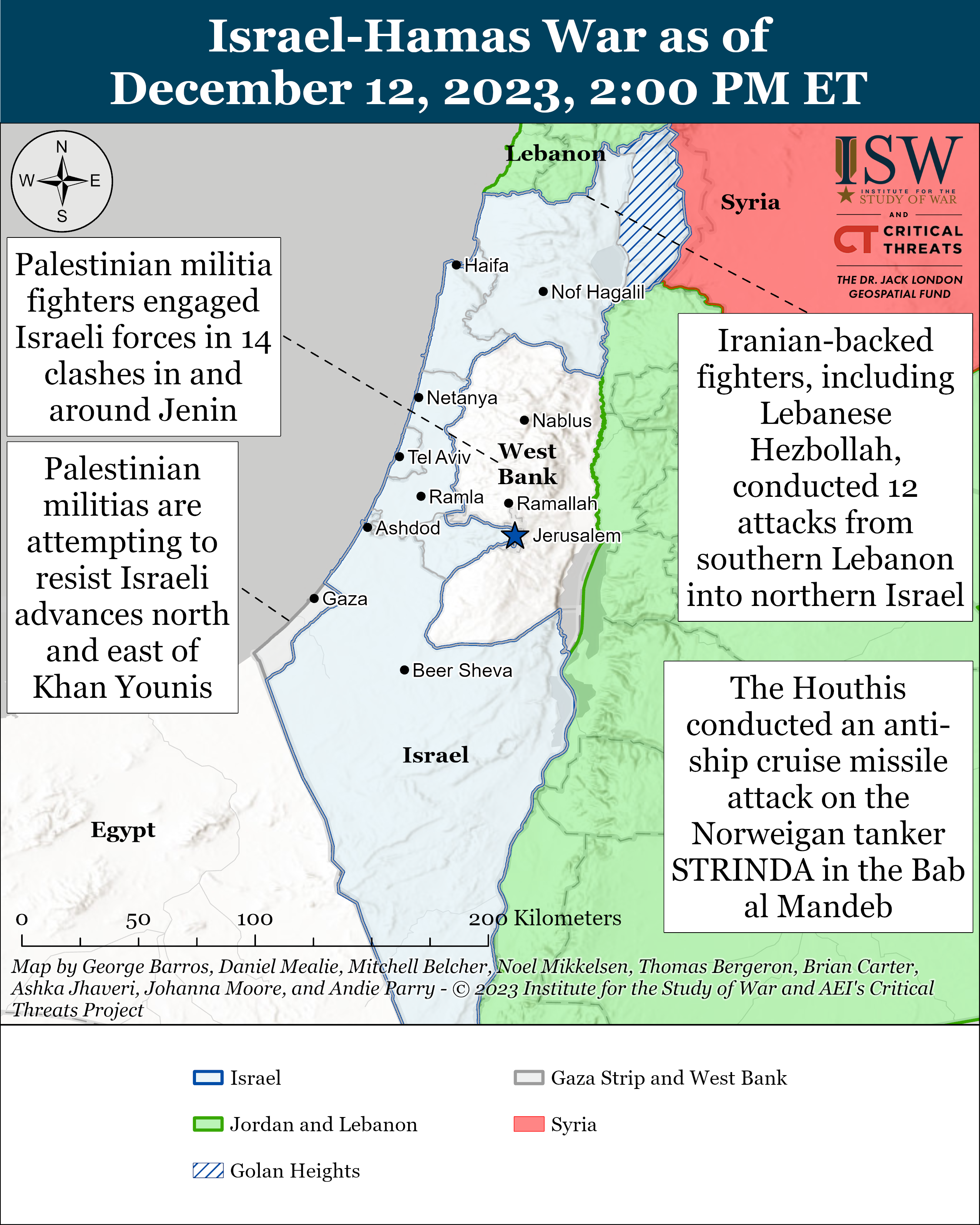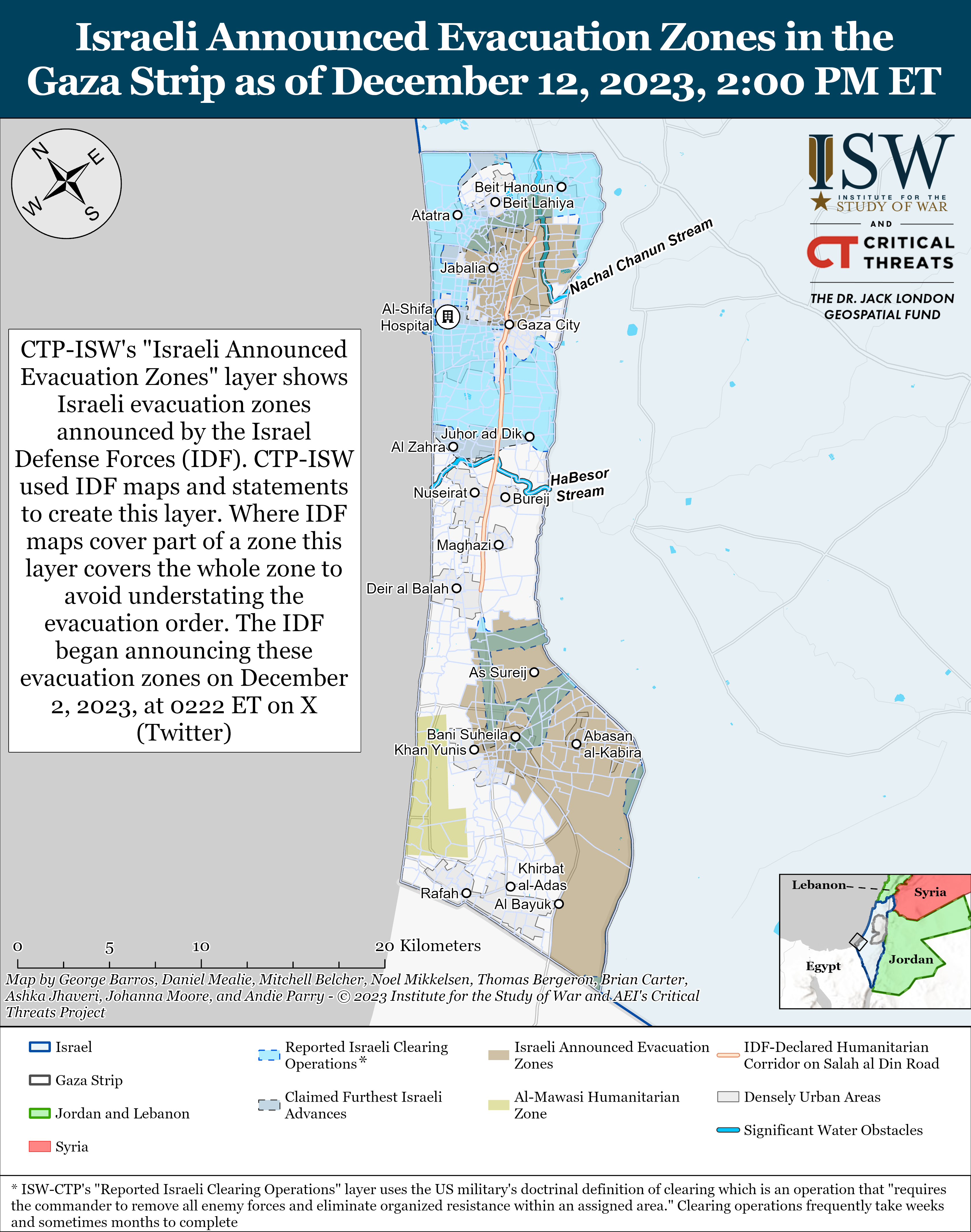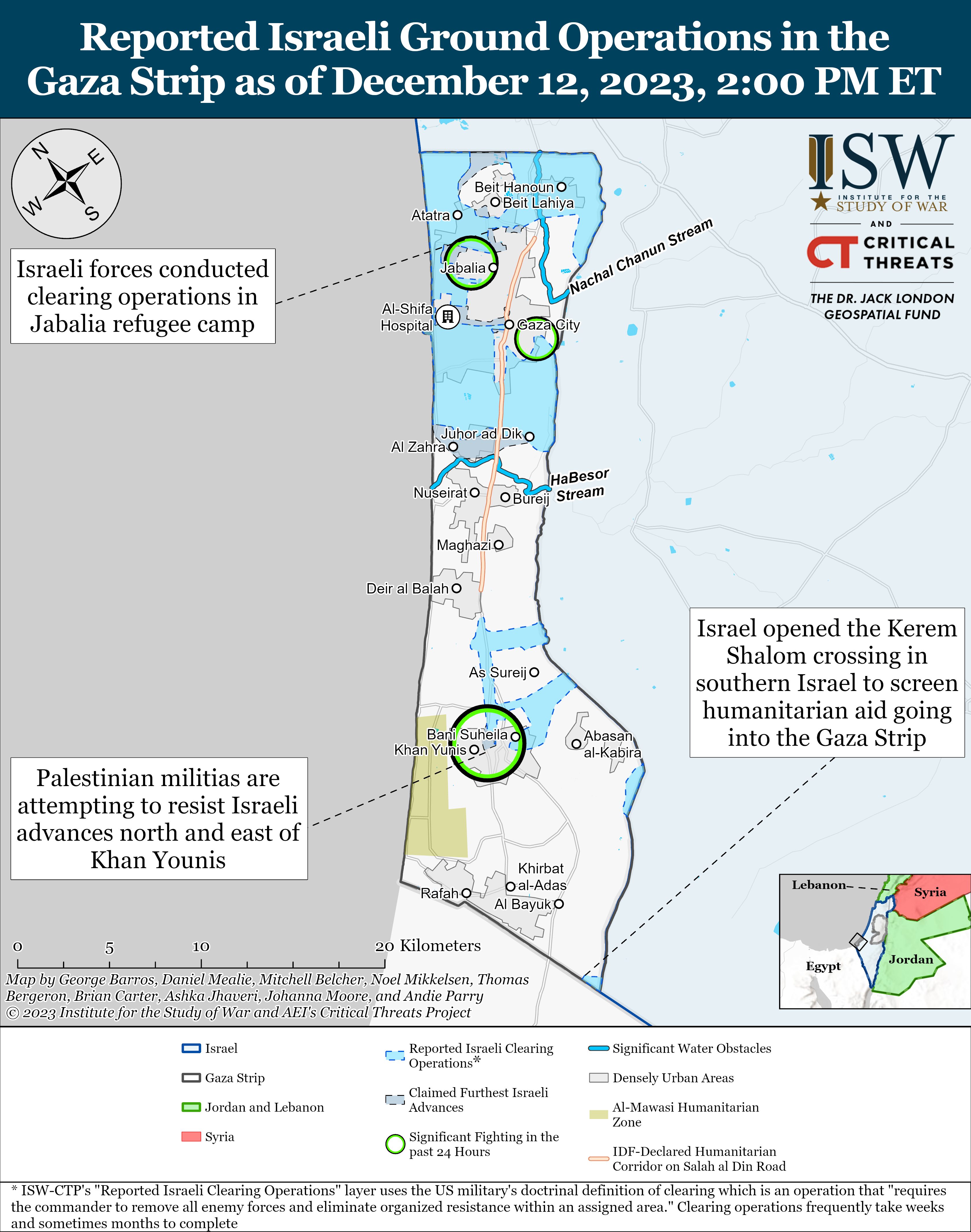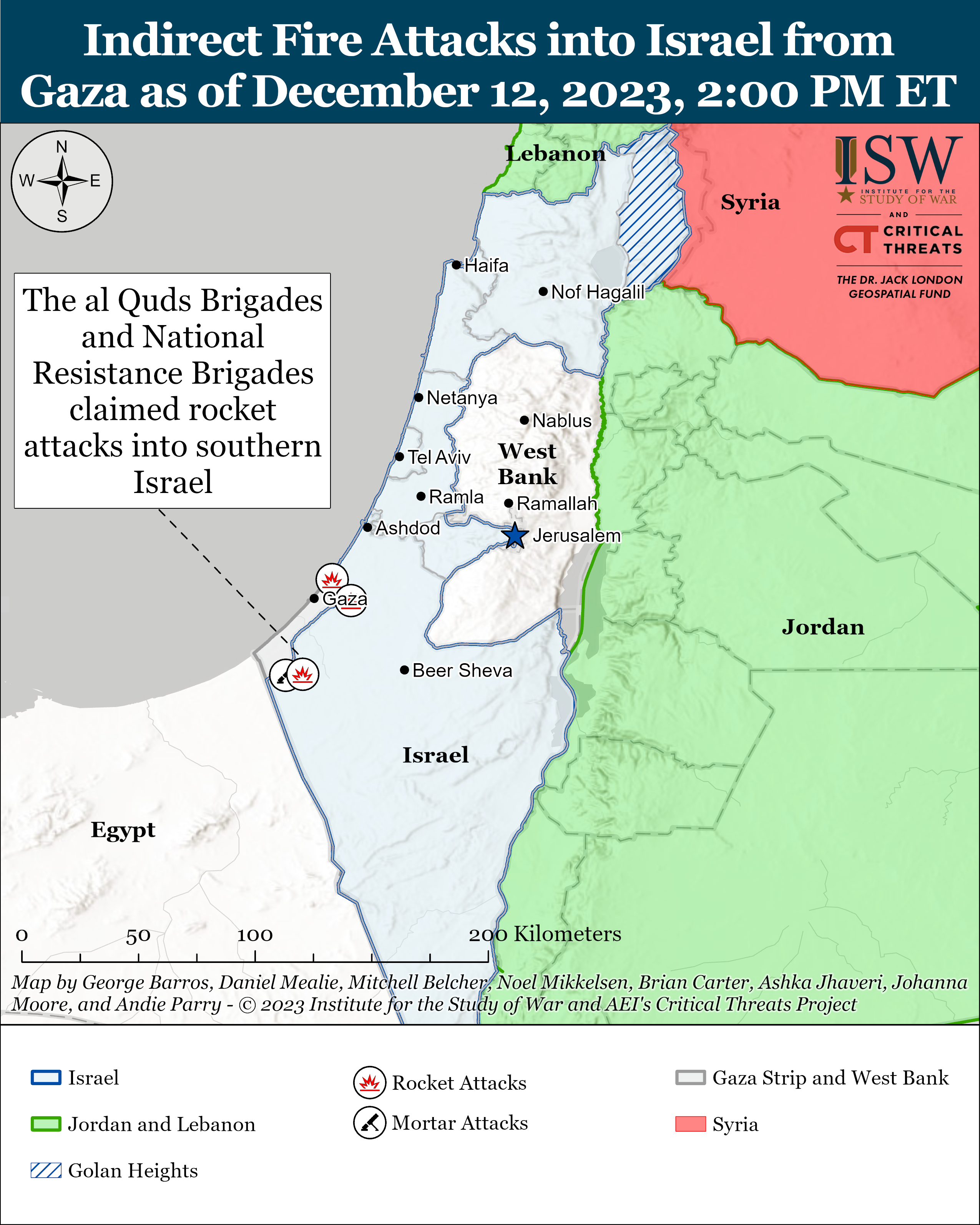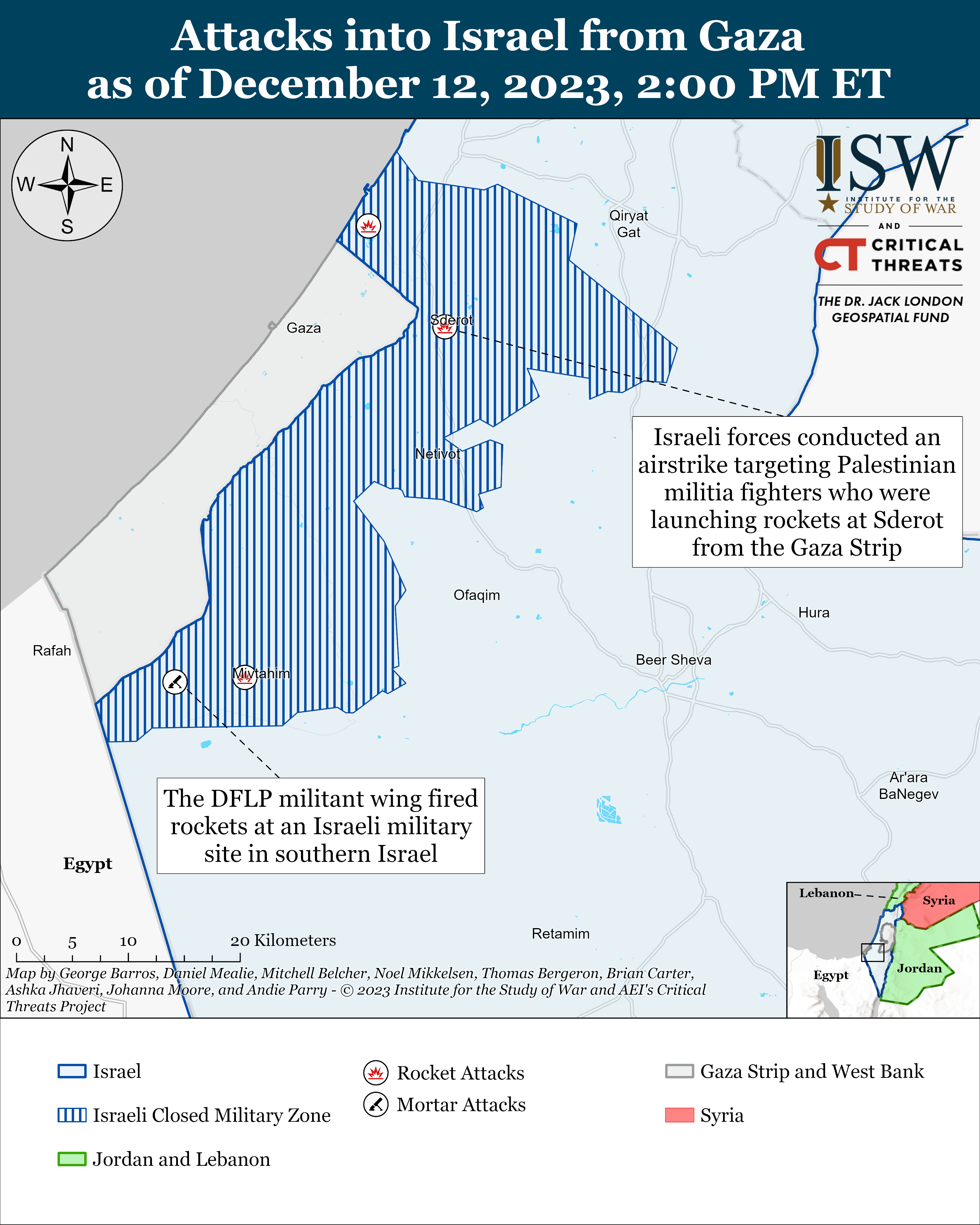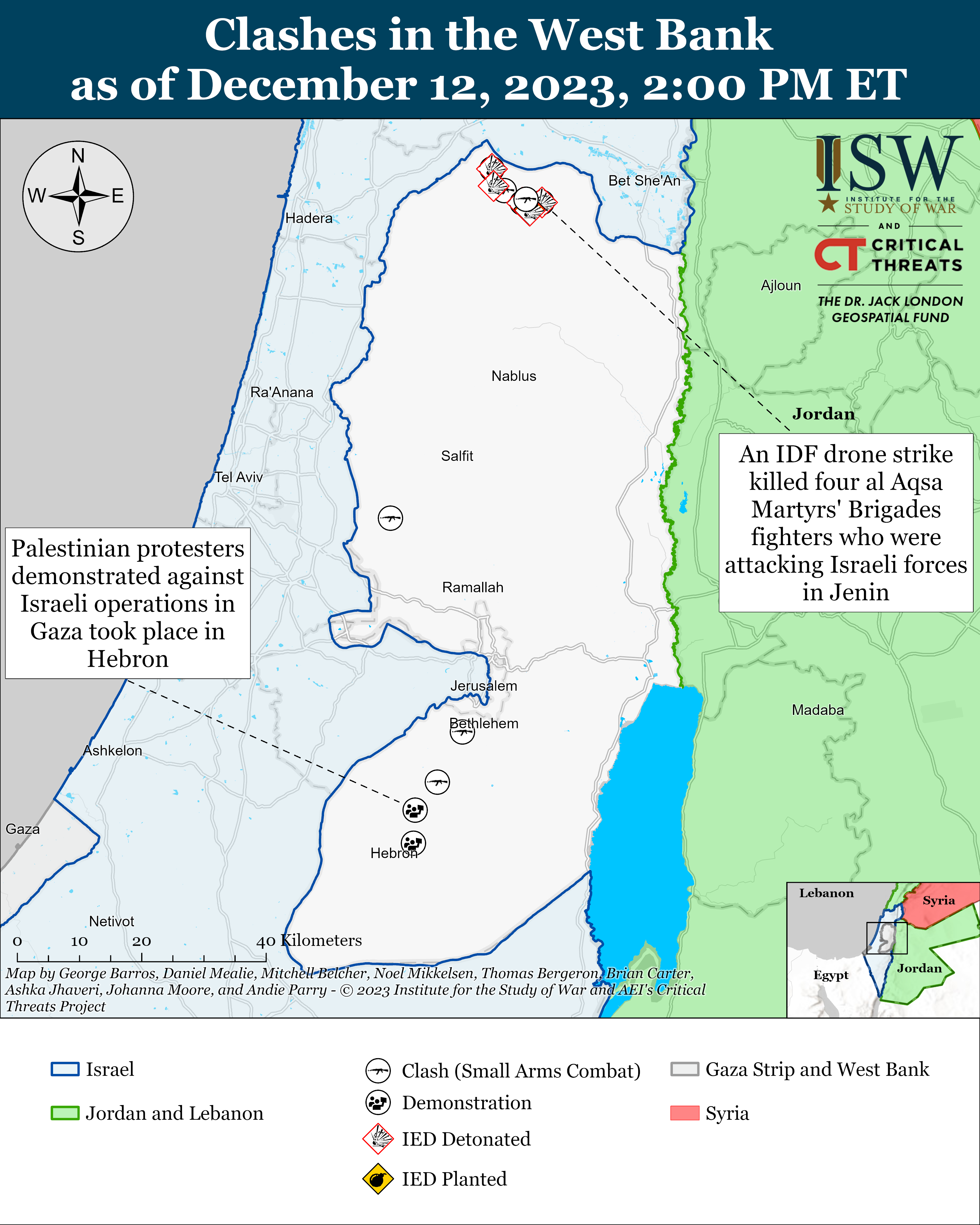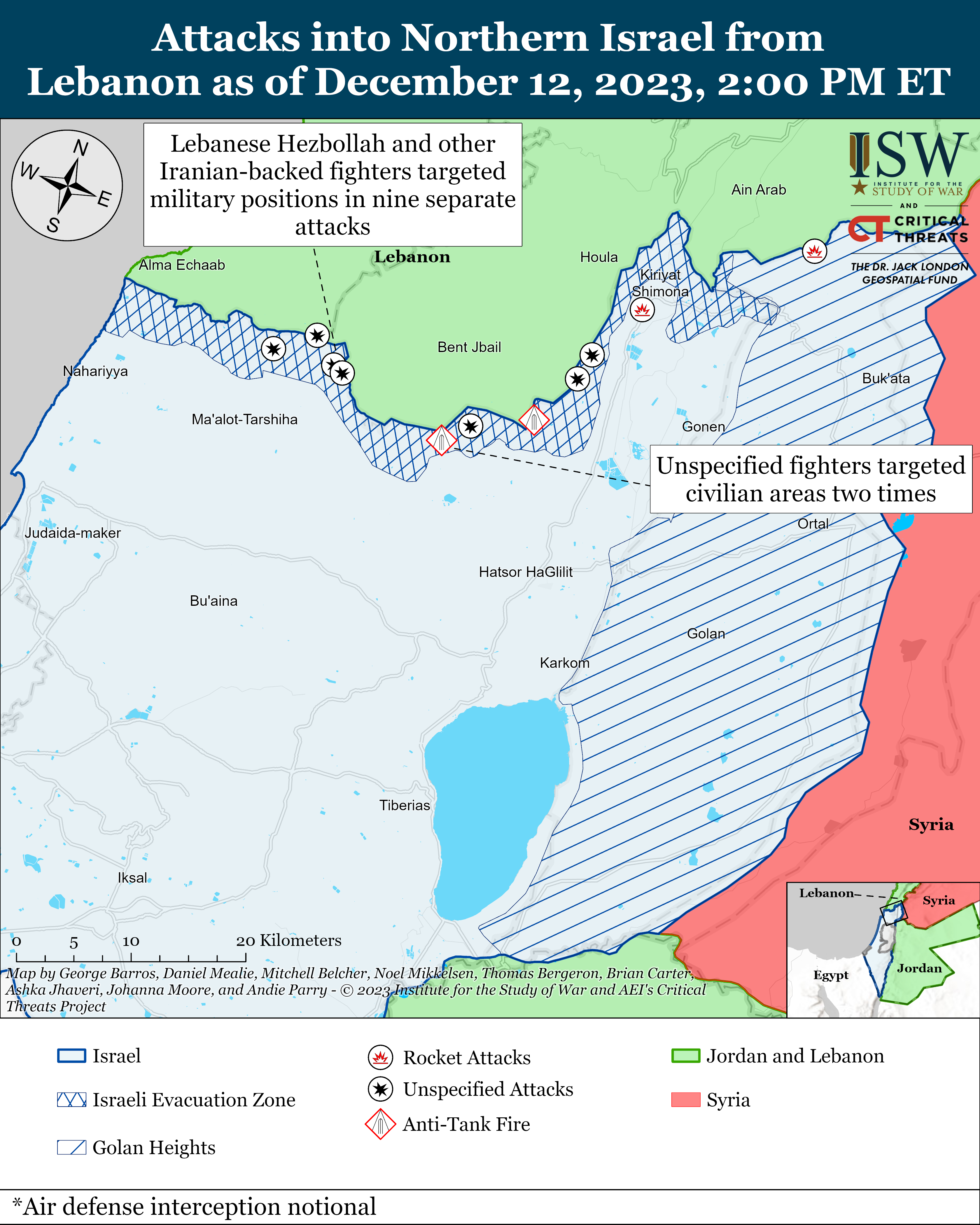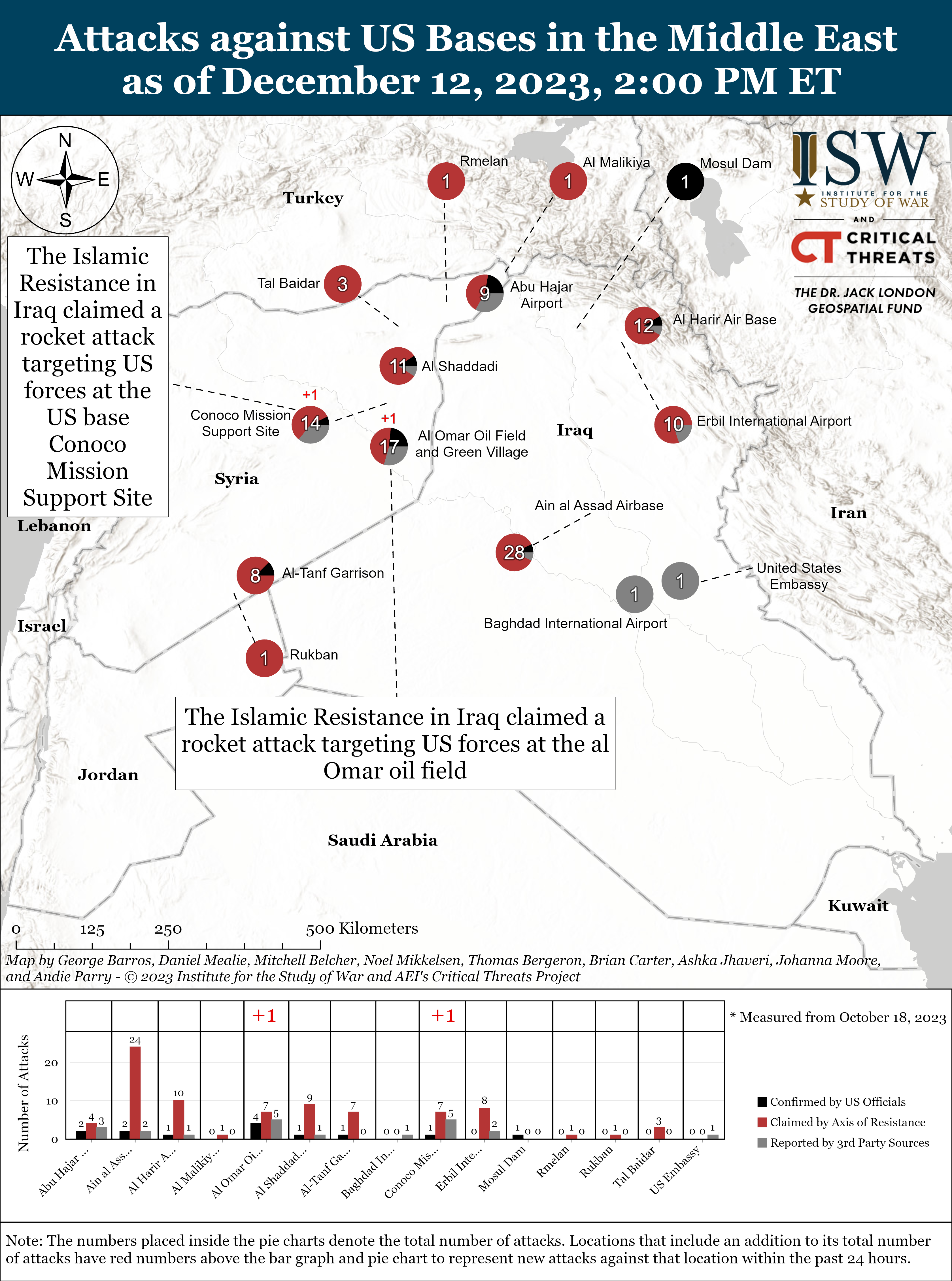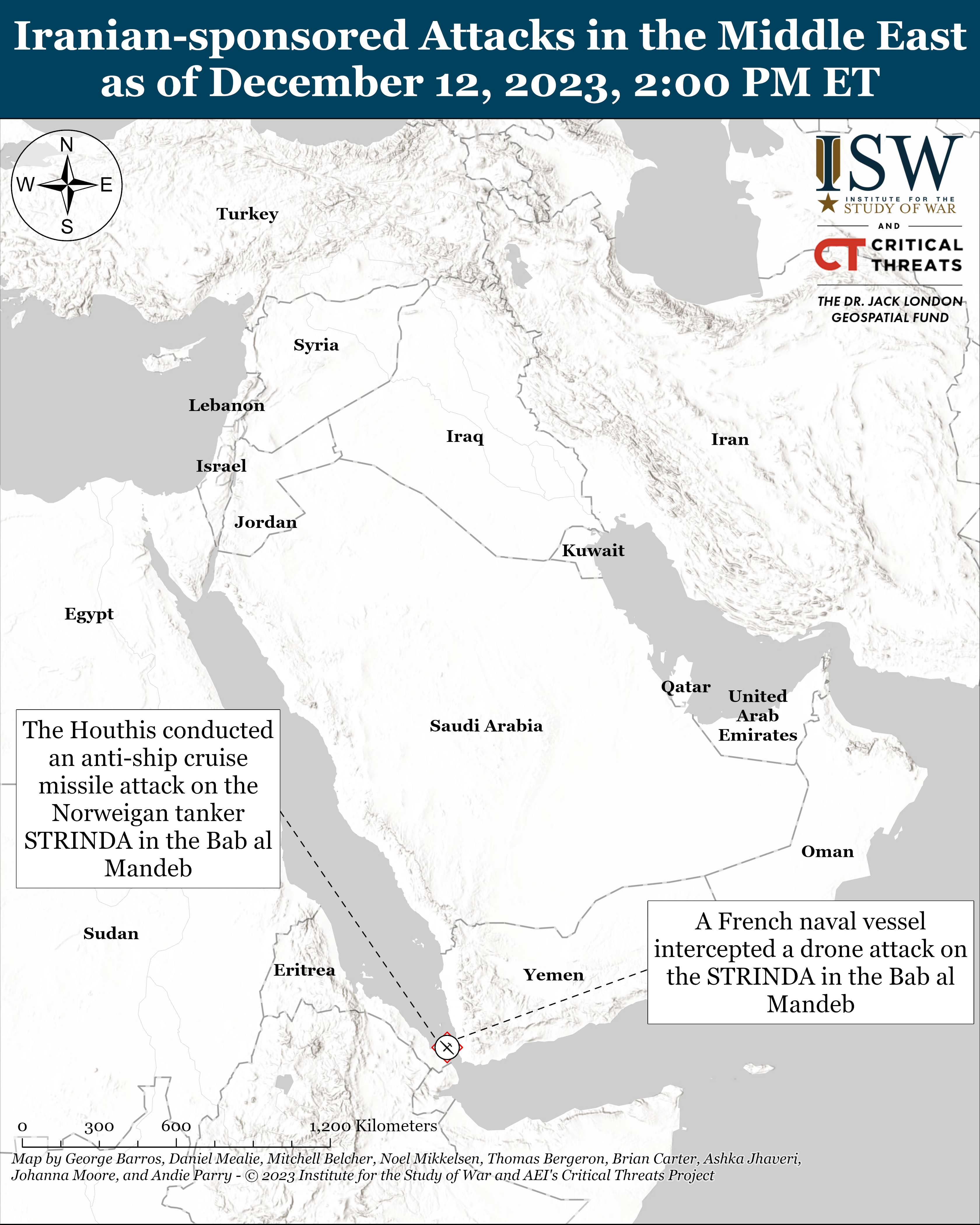Iran Update, December 12, 2023
Ashka Jhaveri, Johanna Moore, Brian Carter, Kathryn Tyson, Annika Ganzeveld, Alexandra Braverman, Peter Mills, and Nicholas Carl
Information Cutoff: 2:00 pm EST
The Iran Update provides insights into Iranian and Iranian-sponsored activities abroad that undermine regional stability and threaten US forces and interests. It also covers events and trends that affect the stability and decision-making of the Iranian regime. The Critical Threats Project (CTP) at the American Enterprise Institute and the Institute for the Study of War (ISW) provides these updates regularly based on regional events. For more on developments in Iran and the region, see our interactive map of Iran and the Middle East.
Note: CTP and ISW have refocused the update to cover the Israel-Hamas war. The new sections address developments in the Gaza Strip, the West Bank, Lebanon, and Syria, as well as noteworthy activity from Iran’s Axis of Resistance. We do not report in detail on war crimes because these activities are well-covered in Western media and do not directly affect the military operations we are assessing and forecasting. We utterly condemn violations of the laws of armed conflict and the Geneva Conventions and crimes against humanity even though we do not describe them in these reports.
Click here to see CTP and ISW’s interactive map of Israeli ground operations. This map is updated daily alongside the static maps present in this report.
Key Takeaways:
- Palestinian militias are attempting to resist Israeli advances north and east of Khan Younis. The IDF Arabic-language spokesperson reiterated orders to residents in Khan Younis and the northern Gaza Strip to evacuate using the Salah al Din Road to Deir al Balah in the central Gaza Strip.
- Israeli forces are likely degrading Hamas’ capacity to conduct indirect fire attacks from the Gaza Strip into Israel. The number of indirect fire attacks conducted daily by Hamas has decreased significantly since October, which is consistent with the assessed degradation of Hamas’ indirect fire capacity.
- The IDF reported that Israeli forces continued clearing operations in Shujaiya, Zaytoun, and Jabalia over the past week. Palestinian militias continued attacks on Israeli forces advancing in Shujaiya neighborhood.
- Israeli forces clashed with Palestinian fighters 17 times in the West Bank.
- Iranian-backed fighters, including Lebanese Hezbollah, conducted 11 attacks from southern Lebanon into northern Israel.
- The Houthis conducted an anti-ship cruise missile attack on the Norwegian tanker STRINDA around the Bab al Mandeb.
- The Islamic Resistance in Iraq—a coalition of Iranian-backed Iraqi militias—claimed responsibility for two attacks targeting US positions in eastern Syria.
- Iranian and Iraqi judicial officials discussed prosecuting the “perpetrators” of the January 2020 US airstrike that killed then-IRGC Quds Force Commander Major General Qassem Soleimani as part of the broader Iranian effort to undermine anti-Iran elements of the Iraqi Security Forces.
- The secretary general of the Iranian-backed Iraqi Badr Organization, Hadi al Ameri, called on the Iraqi central government to expel the US-led international coalition from Iraq.
- Iranian Foreign Affairs Minister Hossein Amir Abdollahian discussed the Israel-Hamas war in separate phone calls with his Russian and Chinese counterparts.
Gaza Strip
Axis of Resistance campaign objectives:
- Erode the will of the Israeli political establishment and public to launch and sustain a major ground operation into the Gaza Strip.
- Degrade IDF material and morale around the Gaza Strip.
Palestinian militias are attempting to resist Israeli advances north and east of Khan Younis. The al Qassem Brigades—the militant wing of Hamas—claimed that it detonated multiple claymore-type, anti-personnel mines targeting ten Israeli soldiers east of Khan Younis.[1] The militia also claimed that it inflicted five casualties during a small arms clash with Israeli forces along the Israeli forward line of advance in al Qarara, north of Khan Younis .[2] The al Qassem Brigades separately mortared Israeli soldiers advancing north and east of Khan Younis.[3] The al Quds Brigades—the militant wing of Palestinian Islamic Jihad (PIJ)—claimed that it conducted four mortar and rocket attacks on Israeli forces advancing into Khan Younis. Al Quds Brigades fighters fired tandem-charge rocket-propelled grenades (RPG) at an Israeli armored personnel carrier east of Khan Younis.[4] The National Resistance Brigade—the militant wing of Democratic Front for the Liberation of Palestine (DFLP)—used mortars against Israeli forces advancing east of Khan Younis.[5] Residents published footage of audible small arms fire east of Khan Younis on December 12.[6] The BBC reported on December 11 that the Israel Defense Forces (IDF) had captured most of the four main towns east of Khan Younis.[7]
The IDF Arabic-language spokesperson reiterated orders to residents in Khan Younis and the northern Gaza Strip to evacuate using the Salah al Din Road to Deir al Balah in the central Gaza Strip.[8]
Israeli forces are likely degrading Hamas’ capacity to conduct indirect fire attacks from the Gaza Strip into Israel. Israeli forces have captured large Hamas weapons caches as they have advanced around and into Khan Younis over the past week.[9] Israeli forces, for instance, captured a Hamas weapon cache that included approximately 250 rockets, mortars, and RPGs.[10] The Givati Brigade destroyed a weapons factory in the Khan Younis area.[11] The Israeli 162nd Division identified a rocket launcher site while Palestinian militants attempted to launch rockets at Sderot and directed an airstrike at the site on December 12.[12] Israeli forces have discovered other rocket launchers and rockets during clearing operations in the Gaza Strip throughout the ground operation as well.[13] An unspecified senior military source told Israeli Army Radio on December 10 that Hamas has ”hundreds” of medium- and long-range rockets left in its arsenal, however.[14]
The number of indirect fire attacks conducted daily by the al Qassem Brigades has decreased significantly since October, which is consistent with the assessed degradation of Hamas’ indirect fire capacity. The al Qassem Brigades has conducted on average about two indirect fire attacks per day since December 6. The al Qassem Brigades claimed an average of about eight attacks per day on Israel between December 1 and December 6, which immediately followed the expiration of the humanitarian pause. This rate demonstrates a noteworthy drop from the average of 12 attacks per day between October 11 and October 16 in the early days of the war.
Palestinian militias in the Gaza Strip conducted at least four indirect fire attacks into Israel on December 12. The al Quds Brigades claimed responsibility for one attack in southern Israel.[15] The National Resistance Brigades claimed responsibility for a rocket attack targeting an Israeli military site in southern Israel.[16] Israeli Army Radio reported red alerts in two towns surrounding the Gaza Strip on December 12, although it is unclear whether there were attacks in these areas.[17]
The IDF reported on December 12 that Israeli forces continued clearing operations in Shujaiya, Zaytoun, and Jabalia over the past week. The IDF reported that its units in these areas have clashed with Palestinian fighters, destroyed tunnels, and seized explosives and weapons.[18] The IDF also reported that it seized memory cards storing unspecified Hamas data about the October 7 attack into Israel. These continued operations in these areas are consistent with the stated IDF priority of clearing Shujaiya and Jabalia in the northern Gaza Strip. Clearing operations of the sort that the IDF is conducting frequently take weeks, if not months, to complete.[19]
Palestinian militias continued attacks on Israeli forces advancing in Shujaiya neighborhood on December 12. The al Qassem Brigades claimed that it detonated unspecified anti-armor improvised explosive devices targeting seven IDF vehicles.[20] The group said that it killed the crew of one armored personnel carrier. The al Qassem Brigades claimed that its fighters killed several Israeli soldiers who attempted to help the crew of one stricken Israeli tank.[21] The al Qassem Brigades claimed that its fighters killed 11 Israelis during fighting in Shujaiya and seized Israeli equipment.[22]
Palestinian militias continued attacks on Israeli forces behind the Israeli forward line of advance, which is consistent with the nature of clearing operations. The al Quds Brigades claimed that its fighters and al Qassem Brigades fighters conducted a combined attack targeting an Israeli position in a house in the Fallujah area of Jabalia refugee camp on December 12.[23] The al Qassem Brigades separately fired a thermobaric rocket targeting Israeli troops in Sheikh Radwan neighborhood on December 12.[24]
The IDF said on December 12 that its navy has destroyed several unmanned submarines in the Gaza Strip and its surrounding waters throughout the Israel-Hamas war.[25] The IDF Arabic-language spokesperson published a graphic of several Hamas naval personnel whom the IDF has killed during the war.[26] The spokesperson said Israel has killed most of the leaders of Hamas’ naval force and hundreds of Hamas members specializing in naval warfare.[27]
Israeli forces recovered the bodies of two hostages held in the Gaza Strip.[28] The IDF said its forces sustained casualties during an operation to identify the locations of the bodies.[29] The Israeli prime minister’s office revised the number of hostages in the Gaza Strip from 137 to 135.[30]
Anonymous US officials reported that Israeli forces began flooding Hamas tunnels in the Gaza Strip with seawater to degrade Hamas’ underground network. US officials briefed on Israeli military operations told the Wall Street Journal that the IDF had started its plan, according to the Wall Street Journal on December 12.[31] Israel previously informed the United States in early November that it was considering flooding the tunnels and that Israel assembled at least five pumps north of Shati refugee camp in mid-November.[32]
Israel opened the Kerem Shalom crossing in southern Israel to screen humanitarian aid going into the Gaza Strip. Israel will screen the aid before it enters the Gaza Strip via the Rafah crossing with Egypt.[33] The United Nations, international aid agencies, and Palestinian relief workers have warned of spreading hunger in the Gaza Strip.[34]
Recorded reports of rocket attacks; CTP-ISW cannot independently verify impact.
Recorded reports of rocket attacks; CTP-ISW cannot independently verify impact.
West Bank
Axis of Resistance campaign objectives:
- Draw IDF assets and resources toward the West Bank and fix them there
Israeli forces clashed with Palestinian fighters 17 times in the West Bank. Fourteen of those clashes occurred in Jenin Governate.[35] The al Aqsa Martyrs’ Brigade—a self-affiliated militant wing of Fatah—fired small arms and detonated IEDs targeting Israeli forces in Jenin.[36] An IDF drone strike killed four al Aqsa Martyrs’ Brigades fighters who were attacking Israeli forces in Jenin.[37] Palestinian fighters also fired small arms and threw IEDs at Israeli forces in three nearby towns, as Israeli forces approached Jenin.[38] The IDF reported that it seized small arms and bomb-making equipment and disabled IEDs in Jenin.[39] Palestinian media reported that Israeli forces arrested 70 individuals in Jenin.[40] CTP-ISW separately observed three demonstrations in Hebron against Israeli operations in the Gaza Strip.[41]
This map is not an exhaustive depiction of clashes and demonstrations in the West Bank.
Southern Lebanon and Golan Heights
Axis of Resistance campaign objectives:
- Draw IDF assets and resources toward northern Israel and fix them there
- Set conditions for successive campaigns into northern Israel
Iranian-backed fighters, including Lebanese Hezbollah (LH), conducted 11 attacks from southern Lebanon into northern Israel on December 12.[42] The attacks targeted primarily military positions. Unspecified fighters launched one rocket salvo targeting the town of Kiryat Shmona.[43] Israeli media separately reported that an anti-tank guided missile hit a civilian building in Baram, northern Israel.[44] LH claimed eight of the 11 attacks into northern Israel.[45]
Iran and Axis of Resistance
Axis of Resistance campaign objectives:
- Demonstrate the capability and willingness of Iran and the Axis of Resistance to escalate against the United States and Israel on multiple fronts
- Set conditions to fight a regional war on multiple fronts
The Houthis conducted an anti-ship cruise missile attack on the Norwegian tanker STRINDA around the Bab al Mandeb on December 11.[46] The Houthi spokesperson claimed the attack on December 12.[47] CENTCOM said that the missile was launched from Houthi-controlled territory and that the attack caused a fire but did not result in any injuries.[48] CENTCOM also said that the USS Mason provided assistance to the STRINDA after the attack. The French FREMM Multi-Mission Frigate Languedoc also said that it “intervened” in a drone attack on the STRINDA while patrolling off the coast of Yemen on December 11.[49] The STRINDA’s owner reported that the tanker was carrying feedstock for biofuel and headed to Italy through the Suez Canal.[50] The Houthi spokesperson contrastingly claimed that the tanker was carrying oil to Israel and that the Houthis fired on the tanker after its crew ignored their warnings.[51] The attack follows a Houthi threat on December 9 to expand their attacks on maritime traffic around the Red Sea to include all vessels traveling to Israel.[52]
The Islamic Resistance in Iraq—a coalition of Iranian-backed Iraqi militias—claimed responsibility for two attacks targeting US positions in eastern Syria on December 12. The Islamic Resistance in Iraq claimed separate rocket attacks targeting US forces at al Omar oil field and Conoco Mission Support Site in Deir ez Zor Province.[53] The group has claimed four attacks on al Omar oil field and seven attacks on Conoco since the Israel-Hamas war began.
The Islamic Resistance in Iraq resumed its attacks on US forces on December 3, two days after the humanitarian pause in the Gaza Strip expired on December 1.[54] The Islamic Resistance in Iraq escalated further on December 8 by conducting more attacks than usual on US forces, claiming responsibility for eleven attacks on US forces in Iraq and Syria.[55]
Iranian and Iraqi judicial officials discussed prosecuting the “perpetrators” of the January 2020 US airstrike that killed then-IRGC Quds Force Commander Major General Qassem Soleimani as part of the broader Iranian effort to undermine anti-Iran elements of the Iraqi Security Forces (ISF).[56] Iranian Judiciary Deputy Chief for International Affairs Kazem Gharib Abadi called on the Iraqi judiciary to “accelerate” its investigation into the airstrike during a meeting Iraqi judicial officials in Tehran on December 5. Gharib Abadi also called on the Iraqi judiciary to submit its indictments to an Iraqi court to begin the prosecution of the “perpetrators” of the strike. Iran and its Iraqi proxies and partners have repeatedly attempted to target Iraqi security officials whom they believe were involved in the January 2020 US airstrike. Iranian-backed Iraqi factions have targeted actors close to former Iraqi Prime Minister Mustafa al Kadhimi, in particular. Kataib Hezbollah has accused Kadhimi of assisting the United States in the airstrike.[57] Kadhimi removed Iranian-backed actors from the Iraqi National Intelligence Service (INIS) and the Iraqi National Security Service (NSS) during his tenure to make these organizations more effective.[58] These efforts caused Iran and its local proxies and partners to view the INIS and NSS as threats to the Iranian project in Iraq. NSS spokesman Arshad al Hakim notably announced that “outlaw groups” damaged the NSS’s headquarters at the same time as the mortar and rocket attack on the US Embassy in Baghdad on December 8.[59]
The December 5 meeting between Iranian and Iraq officials is noteworthy given the ongoing efforts by Iranian-backed Iraqi actors to use legal and political pressure to expel the US forces from Iraq.[60] The present conditions in the Iraqi political landscape are reminiscent of the conditions in 2020-21, when Iranian-backed Iraqi factions conducted a similar effort to remove US forces. The Iraqi Parliamentary Security and Defense Committee announced on December 6, 2023, a draft resolution to expel US forces from Iraq in response to US self-defense strikes on Iranian-backed Iraqi militias.[61] The Iraqi parliament similarly passed a resolution on January 5, 2020, calling on the Iraqi prime minister to order the withdrawal of “all foreign troops” Iraq.[62] Iranian-backed Iraqi fighters have additionally increased their rate of attacks on US forces since the start of the Israel-Hamas war in October 2023 to a level that CTP-ISW has not observed since 2020.[63]
The secretary general of the Iranian-backed Iraqi Badr Organization, Hadi al Ameri, called on the Iraqi central government to expel the US-led international coalition from Iraq during a campaign speech in Wasit Governate, eastern Iraq, on December 12.[64] Ameri emphasized that the Iraqi Army, Popular Mobilization Forces, and Federal Police can defend Iraq without foreign support, implying that US forces are no longer necessary to fight ISIS. Ameri’s statement follows the Iraqi Parliamentary Security and Defense Committee’s announcement on December 6 that it has drafted a resolution to expel US forces from Iraq.[65] The head of this committee is notably a member of the Badr Organization.[66]
Iranian Foreign Affairs Minister Hossein Amir Abdollahian discussed the Israel-Hamas war in separate phone calls with his Russian and Chinese counterparts on December 11 and 12.[67] Both Abdollahian and Russian Foreign Minister Sergei Lavrov emphasized the need for an immediate ceasefire and international assistance to civilians in the Gaza Strip. The Russian Foreign Ministry also announced that the two ministers agreed to accelerate work on an unspecified “new and big” bilateral agreement.[68] Moscow and Tehran have significantly deepened their strategic partnership in recent years, as Iran has provided military support to the Russian invasion of Ukraine. Abdollahian separately warned that if Israel does not stop its attacks on the Gaza Strip, “there is a possibility that an explosion will occur in the region and all sides will lose control” during his call with Chinese Foreign Minister Wang Yi. Abdollahian added that the United States is unable to grasp the risk that the Israel-Hamas war might spill over across the Middle East.[69]Abdollahian has repeated this rhetoric almost daily since the war began, warning that the war could expand if the United States and Israel do not pursue a permanent ceasefire.
Iranian Foreign Affairs Minister Hossein Amir Abdollahian arrived in Geneva for the three-day World Refugee Forum on December 12.[70] Abdollahian plans to discuss the Israel-Hamas war with other foreign officials on the sidelines of the forum.[71]
[61] https://almaalomah dot me/news/49308/politics/%D8%A3%D8%A8%D8%B1%D8%B2-%D9%81%D9%82%D8%B1%D8%A7%D8%AA%D9%87-%D8%B7%D8%B1%D8%AF-%D8%A7%D9%84%D9%82%D9%88%D8%A7%D8%AA-%D8%A7%D9%84%D8%A3%D9%85%D8%B1%D9%8A%D9%83%D9%8A%D8%A9-%D9%85%D8%B4%D8%B1%D9%88%D8%B9-%D9%87%D8%A7%D9%85-%D8%B9%D9%84%D9%89-%D8%B7%D8%A7%D9%88%D9%84%D8%A9-%D8%A7%D9%84%D8%AF%D9%81%D8%A7%D8%B9
[64] https://www.shafaq dot com/ar/%D8%B3%DB%8C%D8%A7%D8%B3%D8%A9/%D8%A7%D9%84%D8%B9%D8%A7%D9%85%D8%B1%D9%8A-%D9%84%D8%A7-%D9%86%D8%AD%D8%AA%D8%A7%D8%AC-%D9%84%D9%82%D9%88%D8%A7%D8%AA-%D8%A7%D9%84%D8%AA%D8%AD%D8%A7%D9%84%D9%81-%D8%A7%D9%84%D8%AF%D9%88%D9%84%D9%8A-%D9%81%D9%8A-%D8%A7%D9%84%D8%B9%D8%B1%D8%A7%D9%82-%D9%88%D9%8A%D8%AC%D8%A8-%D8%A7%D9%86-%D9%8A%D8%AE%D8%B1%D8%AC%D9%88%D8%A7-%D9%81%D9%88%D8%B1%D8%A7
[65] https://almaalomah dot me/news/49308/politics/%D8%A3%D8%A8%D8%B1%D8%B2-%D9%81%D9%82%D8%B1%D8%A7%D8%AA%D9%87-%D8%B7%D8%B1%D8%AF-%D8%A7%D9%84%D9%82%D9%88%D8%A7%D8%AA-%D8%A7%D9%84%D8%A3%D9%85%D8%B1%D9%8A%D9%83%D9%8A%D8%A9-%D9%85%D8%B4%D8%B1%D9%88%D8%B9-%D9%87%D8%A7%D9%85-%D8%B9%D9%84%D9%89-%D8%B7%D8%A7%D9%88%D9%84%D8%A9-%D8%A7%D9%84%D8%AF%D9%81%D8%A7%D8%B9


